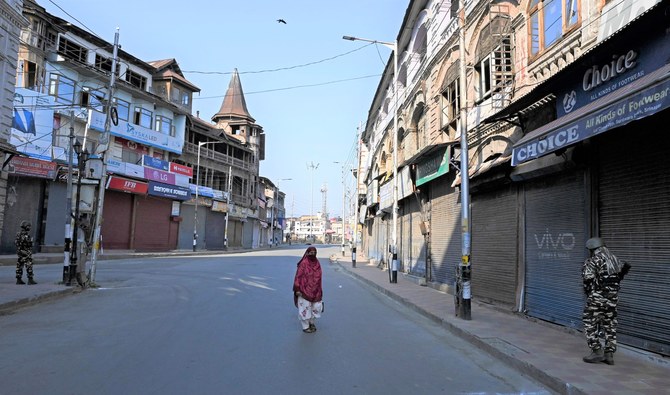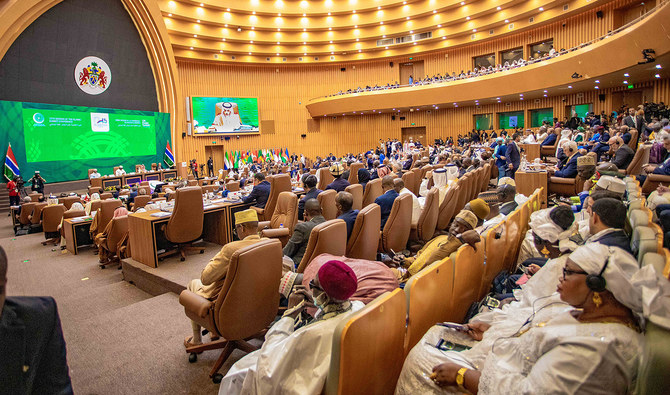NEW DELHI: Anticipating protests on the first anniversary of the abrogation of Article 370 which granted a special autonomous status to Indian-administered Kashmir, a two-day curfew has been imposed in capital Srinagar, with officials saying that the move was meant to prevent violence by groups planning to observe August 5 as a “black day.”
“There are specific inputs about violent protests endangering public life and property,” Srinagar district magistrate Shahid Chaudhary said in an order on Monday, adding that “protests are not ruled out” and separate groups are “planning to observe August 5 as black day.”
It follows New Delhi’s decision to annul Article 370 and Article 35A of the constitution on August 5 last year, both of which granted limited autonomy and exclusive rights to Kashmiris under the Indian union, which Prime Minister Narendra Modi had termed as “historic” at the time.
“It is a new beginning for the people of Jammu and Kashmir. Article 370 of the constitution has not benefited the people. It has only bred militancy and separatism in the state,” he had said.
The revocation removed a bar on the purchase of property by Indians from outside Jammu and Kashmir and meant that state government jobs, among other liberties, would no longer be reserved for state residents.
The move also bifurcated the state into two federally administered units – Union territory of Ladakh and the Union Territory of Jammu and Kashmir.
Before the announcement and as part of the measure, New Delhi imposed a strict lockdown in the valley and suspended all political and democratic institutions before detaining hundreds of political leaders and civil society activists and suspending Internet and telecommunication services in the area.
There was a lot of public anger then as there is now, with international rights body Human Rights Watch (HRW), condemning the imposition of “harsh and discriminatory restrictions” in the valley last year, on Tuesday.
“Indian government claims that it was determined to improve Kashmiri lives ring hollow one year after the revocation of Jammu and Kashmir’s constitutional status,” Meenakshi Ganguly, South Asia director at HRW, said in a statement.
Besides paralysing the lives of civilians and business owners in the valley, the continuous lockdown in Kashmir since last year also devastated its economic potential with the Kashmir Chamber of Commerce and Industry (KCCI) demanding a bailout package to revive the area.
“In the last year, we have lost $5.3 billion as a result of the lockdown. More than 500,000 jobs have vanished. We are in a dire state and need an immediate package to survive. Otherwise, thousands of marginal families would face a survival issue,” Sheikh Ashiq Ahmad, president of KCCI, told Arab News.
Shamim Ahmad Shah, a Srinagar-based houseboat owner and hotelier agrees, adding that the past year had been nothing but “a year of miseries.”
“The government has ruined our business and all the economic mainstay of the state. We are suffering economically and politically,” Shah told Arab News.
The political class has also faced the brunt of the crackdown with many mainstream politicians still under detention.
“The whole year has been a nightmare for the entire population,” Naeem Akhtar, spokesperson of the local political group, People’s Democratic Party (PDP), told Arab News.
The PDP is a prominent regional political player in the valley, running the state in alliance with the ruling Bharatiya Janata Party (BJP) for two years before it was dismissed in 2018.
Its president, Mehbooba Mufti, remains under detention along with many senior leaders.
“The very act of August 5 has been a great betrayal and what followed has been nothing else than a nightmare, the worst experience of collective punishment that any people in the globe could have experienced,” Akhtar who is under a house arrest in Srinagar after 11 months in jail, said.
He added that revoking Article 370 was “not for the development of the state,” as claimed by New Delhi, but rather for the “demographic alteration of the Muslim majority state of India.”
“For Kashmiris, it’s a hopeless situation. We are witnessing the change in the ground most of which lead to the domination of the majoritarian Hindu agenda aimed at socio-political engineering for outnumbering the Muslim population of the state so that it can be replaced by Hindu majority population,” the PDP leader said.
Meanwhile, voices of concern echoed across the valley.
“A year later, Jammu and Kashmir continue to be in a social, economic, political and communication lockdown. None of the stated goals of the government – of bringing Kashmir closer to India, ending militancy, bringing development to the state – have been achieved,” a group of five citizens comprising former foreign minister Yashwant Singh, and Air Marshal (Retd) Kapil Kak, said in a statement on Monday, adding that Kashmiris “fear that new Delhi wants to marginalize them” by injecting “demographic change”.
“The Kashmiris have lost any faith they had in the Indian political leadership and the judiciary,” they added.
Deeba Ashraf, a Srinagar-based lawyer, describes August 5 as “the day of mourning for us”.
“When the Narendra Modi regime will celebrate on August 5, we in Kashmir will mourn. Things have worsened here, and more and more youth are joining militancy out of frustration and humiliation,” Ashraf, 22, told Arab News.
Others talk about how the valley has been “pushed back in time.”
“Nothing has been achieved in the last one year in Kashmir. So neither has the violence stopped nor has the region’s economy improved. New Delhi’s narrative of developing the region after scrapping Article 370 has become a laughing stock,” Gowhar Geelani, a Srinagar-based political analyst and author told Arab News.
Kashmir-based human rights activist Khurram Parvez says that after the abrogation of Article 370, the state has also taken away “whatever little democratic rights Kashmir enjoyed before August 5 last year.”
“Dissent has been completely stifled in the region; democratic rights voices have been silenced by invoking harsh and draconian laws against the practitioner of democracy. Silencing people using fear as a weapon has been unprecedented in the history of Jammu and Kashmir,” he told Arab News.
Experts say the move has proven to be damaging not only in the valley but for other parts of the region.
“In Ladakh’s Leh district, there is deep dissatisfaction with the BJP-led government, in Ladakh’s Kargil area, the distrust against New Delhi has further accentuated. Hindu-dominated Jammu was too feeling fear of intrusion in its native monopoly in commerce,” Professor Siddiq Wahid, a Srinagar based expert on Central Asia and Kashmir, said.
“Internationally, India is witnessing a downward trend in its prestige after the abrogation of Kashmir’s special status.”
The Muslim-majority Himalayan region of Kashmir has been at the heart of more than 70 years of fighting, since the partition of the British colony of India into Pakistan and India.
















